5 Turkish Sayings that will give you an insight into Turkish culture

The Art of Living in Turkey contains affiliate links and is a member of the Amazon Services LLC Associates Program. If you make a purchase using one of these Amazon links, I may receive compensation at no extra cost to you. See my Disclaimers for more information.
Every culture has its unique idioms, phrases, and proverbs that reflect its values, experiences, and worldview. Turkish sayings, in particular, offer a fascinating glimpse into the heart of Turkish culture.
While many cultures share similar phrases, giving credit to specific origins can be tricky—language, after all, is a melting pot of shared ideas.
Some of these Turkish expressions may have roots in other cultures, yet they’ve become uniquely Turkish in both use and sentiment.
What I find truly special about these sayings is how they capture what Turks hold dear. They reveal not only the values but also the wisdom passed down through generations.
Using these idioms correctly as a foreigner brings a warm reaction from locals. It’s an acknowledgment that you’ve taken the time not just to learn Turkish but to understand it—a high compliment in Turkish culture.
Since moving to Turkey in 2019, I’ve been dedicated to learning the language, and discovering its idioms has been a favorite part of my journey. Turkish sayings bring the language to life, adding nuance and insight along the way.
It seems like my friends are always teaching me new ones. It has also given me much empathy as I use one with people who don’t know English as well. They can be confusing and a bit weird if I am honest.
Join me as we explore 5 Turkish idioms and their meanings—each one a small window into the beautiful complexity of Turkish culture.
Learn a few Turkish Phrases
1. Pİreyİ deve yapma
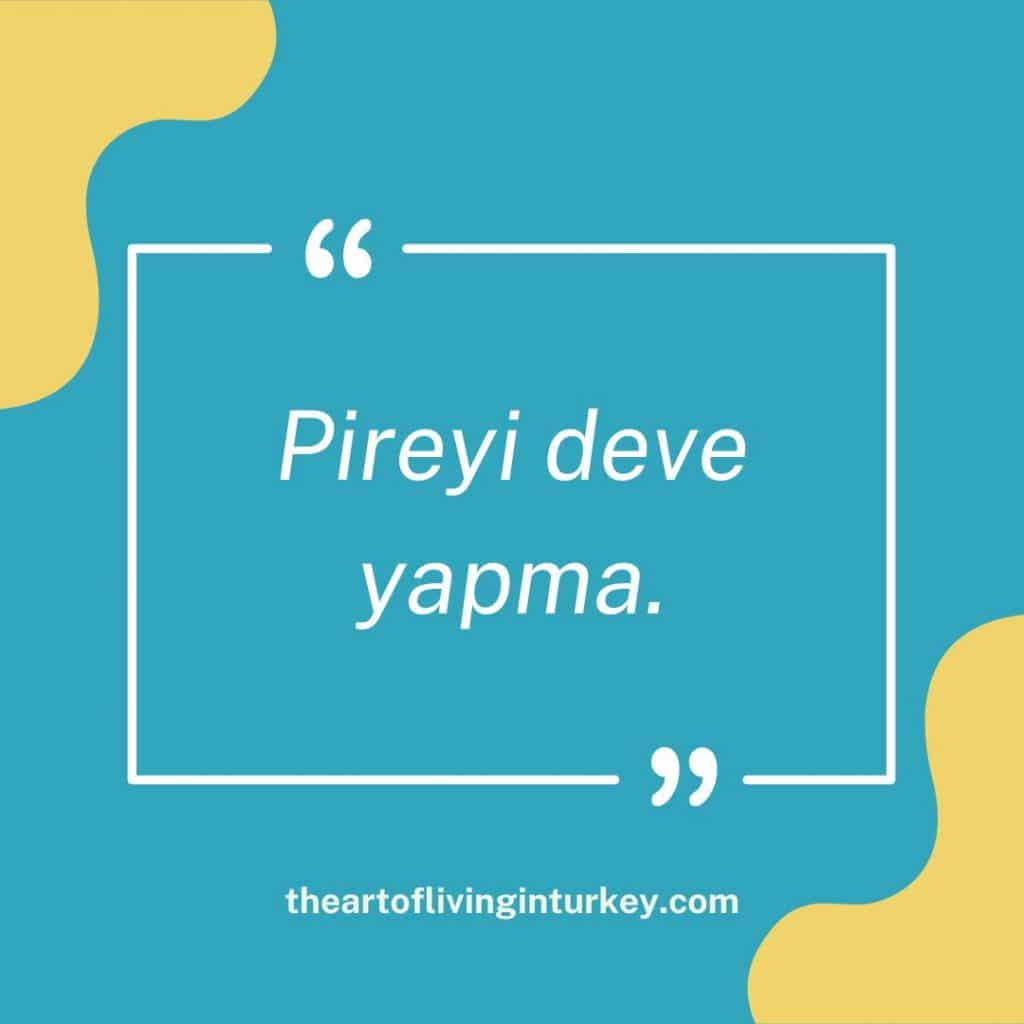
Literally: Don’t make a flea a camel
English equivalent: Don’t make a mountain out of a molehill.
Meaning: Don’t exaggerate. Don’t take something that is small and insignificant and make it into something bigger than it actually is.
It could be used in a context where someone isn’t accepting your small flaws, you’re a few minutes late, or even when someone is planning something and looking at even the smallest detail.
For example
Bu işi yapmak istemediğinden küçük bir problem büyütüyor, pireyi deve yapıyordu. He is making a mountain out of a molehill, making a big problem out of something small because he doesn’t want to do this job. (Example taken from Deyim Kartları.)
2. Lafla peynİr gemisi yürümez
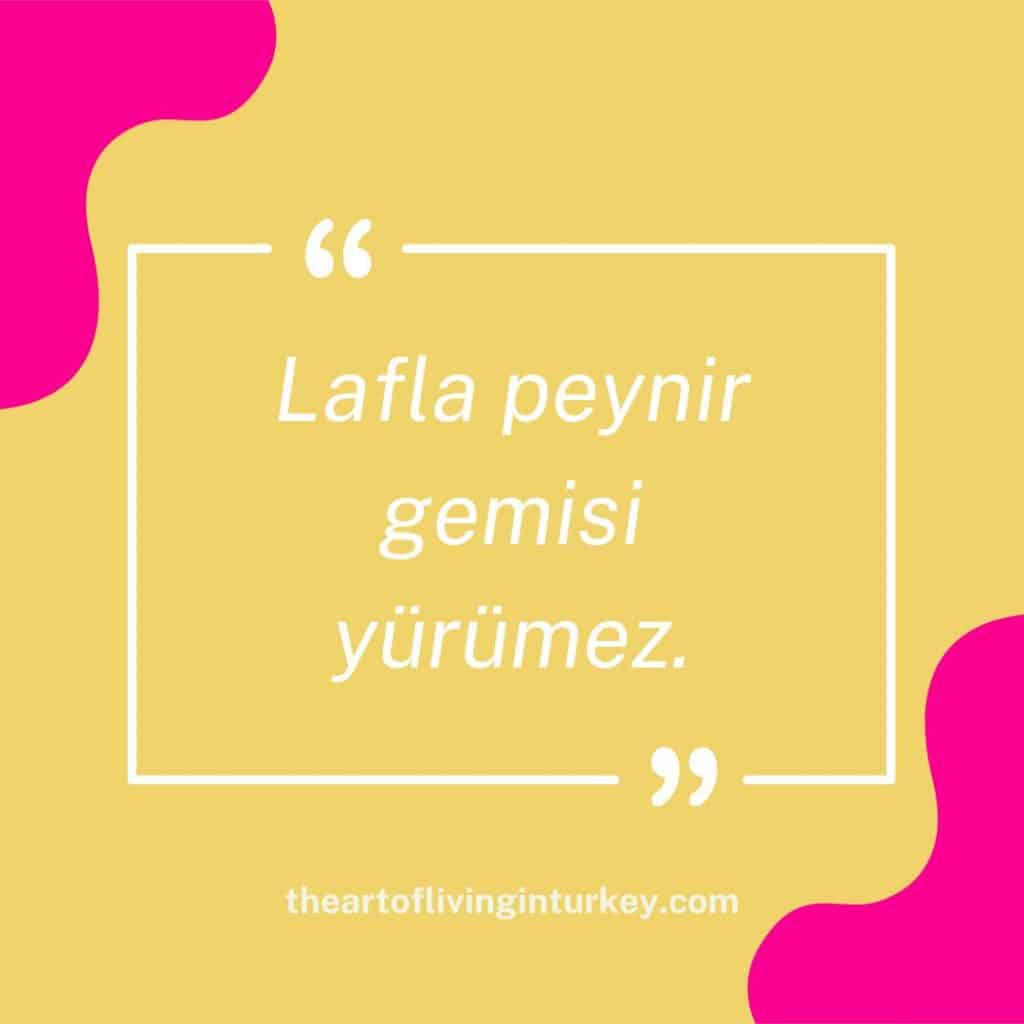
Literally: The cheese ship won’t move with words.
English Equivalent: Actions speak louder than words.
Meaning: Words aren’t what makes something happen. The action is the important thing. People often talk about all the things they will do, want to do, or even need to do but then don’t do them.
If you never take action, the thing will never get done.
In Turkish culture, this comes from a story about a captain and a merchant. The merchant didn’t want to pay the necessary fees upfront and would always delay.
Eventually, the captain told him that the ship (full of cheese) wouldn’t run on words alone. The ship needed oil and coal. He eventually paid and the captain shipped the cheese.
For example
Sen bana “yapacağım, yapacağım!” diye anlatacağına git de yap, lafla peynir gemisi yürümez. You tell me “I will, I will!” Instead of telling him, go and do it,
a cheese ship cannot run on words. (Example taken from hurriyet.com)
3. Doğru söyleyenİ dokuz köyden kovarlar
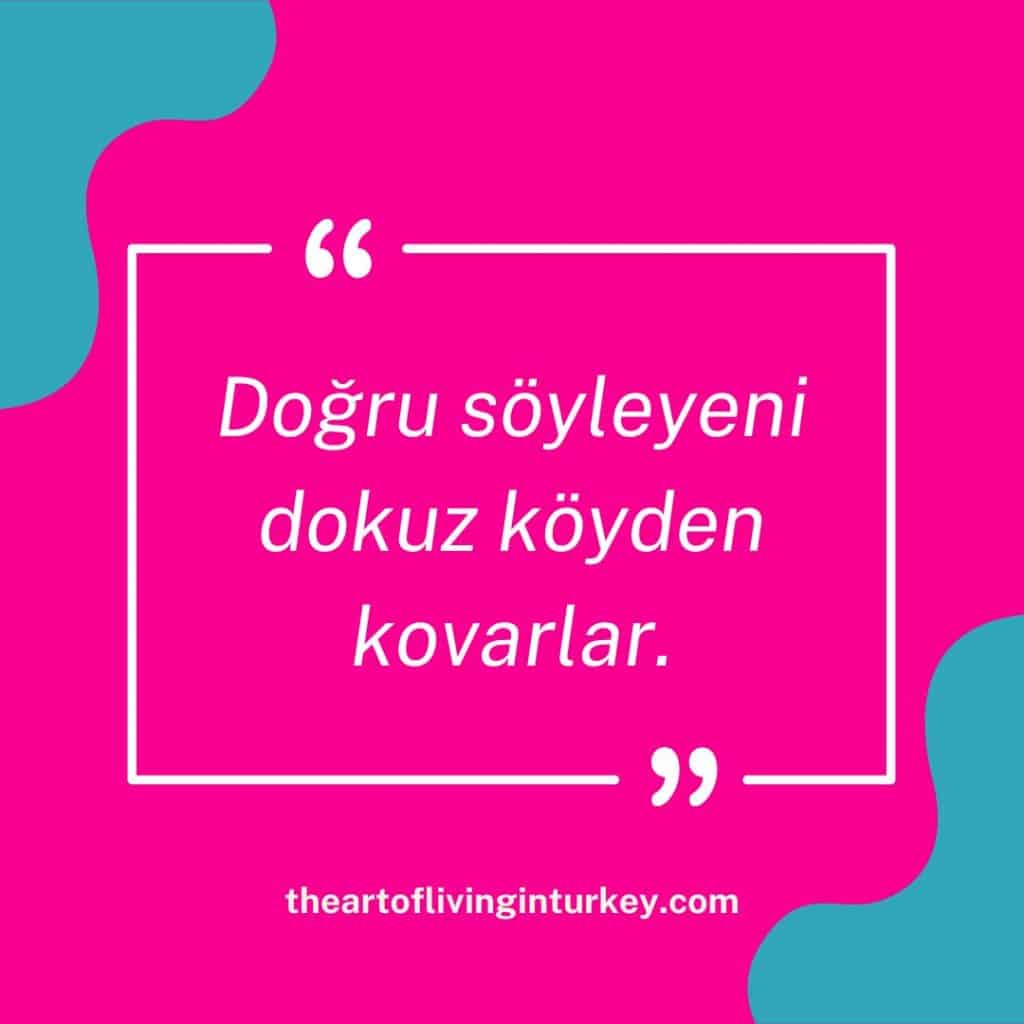
Literally: Those who speak the truth are expelled from nine villages.
English equivalent: All truth is not always to be told.
Meaning: Especially in an honor-shame culture it is important to note that the truth and rightness are not always the most valued thing unlike in many Western cultures. Sometimes telling the truth means you don’t get treated so warmly.
If truth is said for a situation that is contrary to the interests of the other person, then he will probably be accused of being “bad”.
People who tell the truth are excluded from the society they live in if they go against the interests of the people.
If someone is always speaking the truth on every subject and is constantly contradictory it is hard to get along with that person. This is about this type of experience.
For example
Sana doğruları söylediğim için bana böyle davranıyorsun. Doğru söyleyeni dokuz köyden kovarlar diye boşuna dememişler. You treat me like this because I told you the truth. It is not for nothing that they say that they will expel anyone who tells the truth from nine villages. (Example taken from hurriyet.com.)
4. Maydanoz Olma
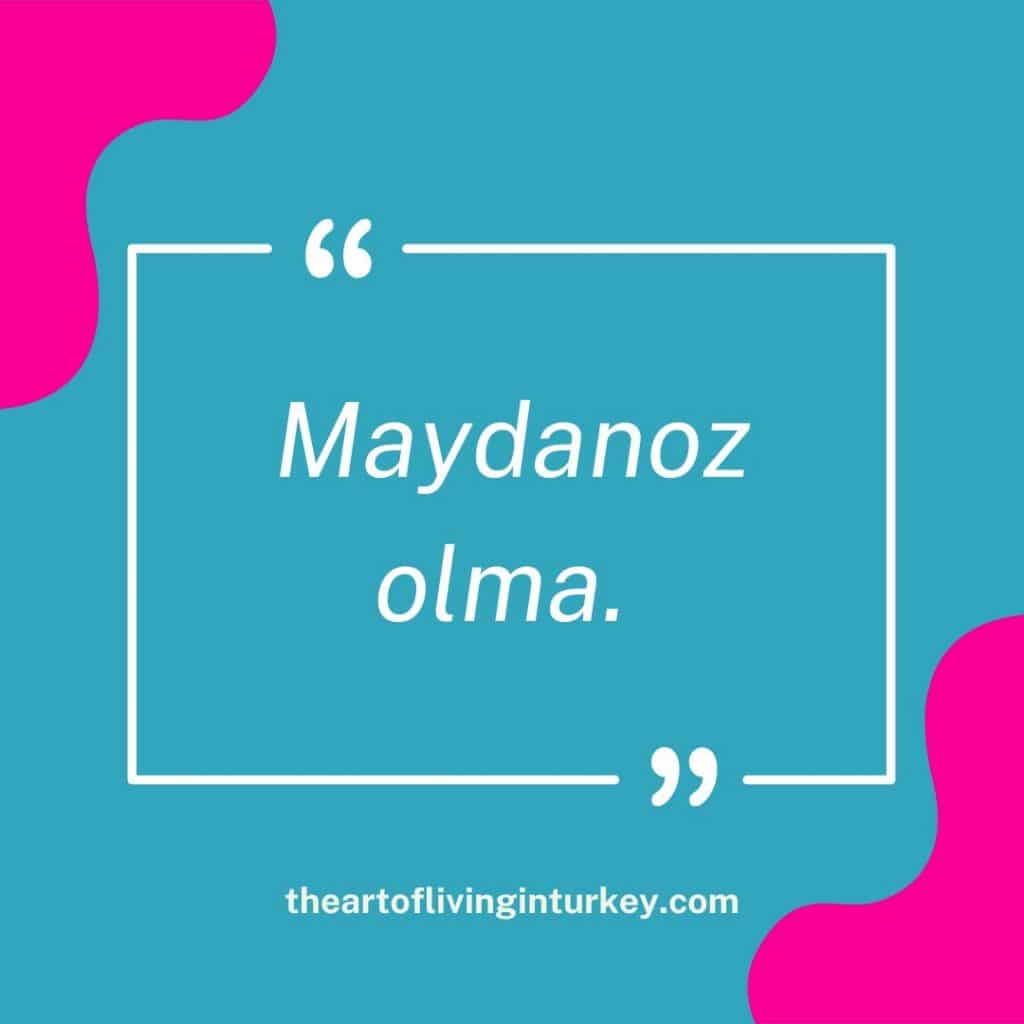
Literally: Don’t be parsley.
English equivalent: Don’t stick your nose in everything.
Meaning: In Turkey, parsley is used in all the foods. We put it in soups, meatballs, main dishes, salads, etc. Whatever is going on, there’s a good chance that parsley will be a part of it.
That being said, this is about someone who goes around sticking their nose in everything. You can say this phrase to your nosey friend.
Or when someone is asking questions about things you don’t want to talk about, though it will be considered ruder with someone you don’t know.
“Sana ne” literally means “What is it to you?” and it is the most abrasive option of them all. When I learned this in my Turkish lessons, I loved it immediately!
One time I was walking in winter with just a sweater on because I wasn’t cold. I got scolded by a teze (auntie) for not having a jacket on. I didn’t want to be rude but in my head, I told her “Sana ne?” I could have said, “Maydanoz olma!”.
For example
Bana maydanoz olma, git içeriyi temizle. Don’t be a parsley, go inside and clean. (Example taken from dersimiz.com)

5. Ayağını yorganına göre uzat
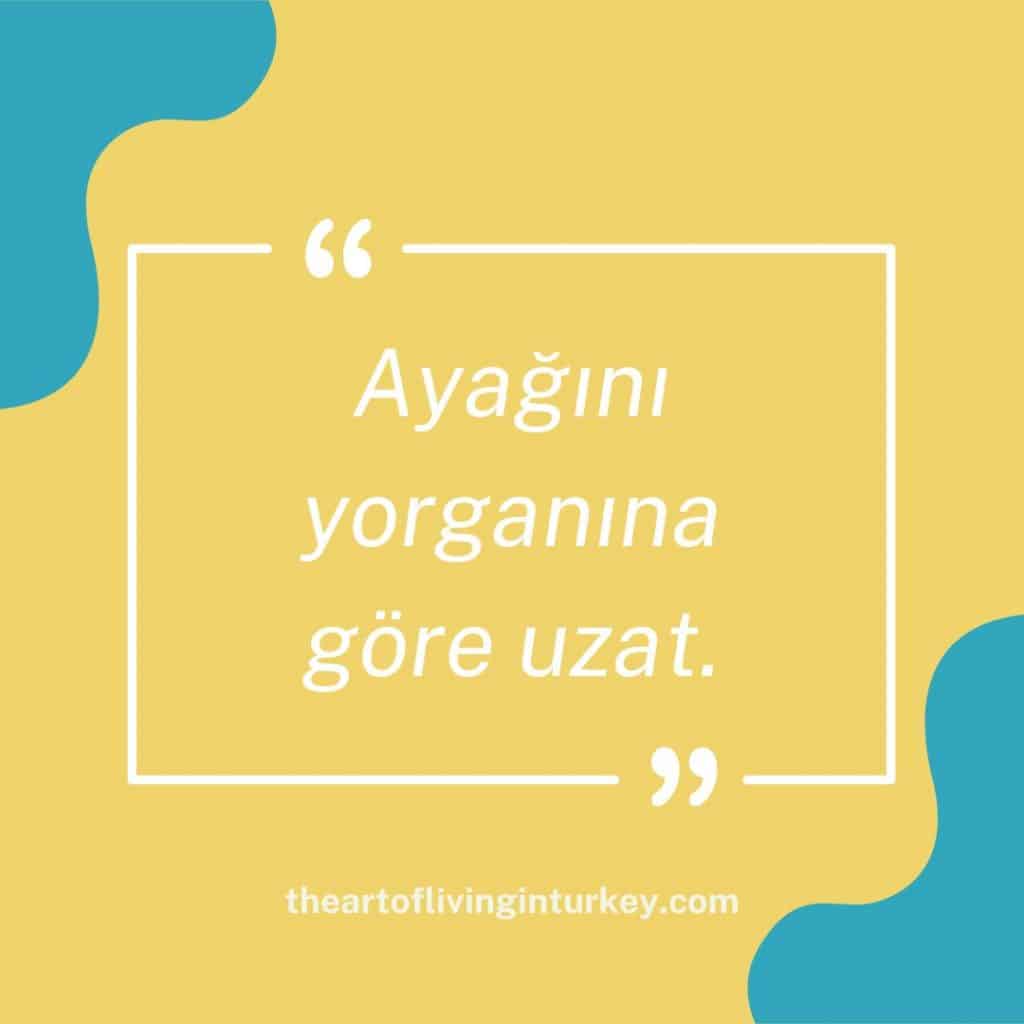
Literally: Stretch your feet according to your quilt.
English equivalent: Don’t spend more money than you have.
Meaning: This phrase is usually used relating to someone who has a lot of debt with high interest or doing something that is beyond what their means would allow.
Especially during an economic crisis, this is the most commonly used idiom as more and more people open lines of credit with high interest rates. The encouragement is to not get yourself in over your head.
Whether that is in daily life, like using a credit card for going out with friends, or in bigger things like getting a bigger loan than you can afford for purchasing a house or vehicle.
For example
Bu şekilde harcama yapmaya devam etmemelisin, ayağını yorganına göre uzat. You shouldn’t keep spending like this, stretch out your foot according to your comforter. (Example taken from hurriyet.com)
6. Akıl akıldan üstündür

Literally: The mind is superior to the mind or reason is superior to reason.
English equivalent: Two heads are better than one.
Meaning: This phrase is usually used to convey the idea that it is good to be open to others’ input, both advice and criticism. Everyone doesn’t understand everything the same way so it’s important to consider how others understand.
Sometimes, something coming from a frustrating source can even provide something of high value. This is definitely something that is a good life lesson.
It reminds me of the English idiom “don’t through the baby out with the bath water.” You can take what is valuable and leave the rest behind.
For example
Bunu iyi düşündün, akıl akıldan üstündür. You though about this well, two heads are better than one. (example from hurriyet.com)
7. Balık etli

Literally: fish fleshed.
English equivalent: Meat on their bones.
Meaning: This is a compliment when given. Most Turkish men like their women to be a bit more curvy.
So if someone says this to you, they aren’t calling you fat but they are complimenting the curves of your body.
For example
Balık eti bir çocuk olduğu için göze çok sevimli geliyor. Chubby looks very cute to the eyes because it is a child. (Example from Basari Siralamasi)
A Bonus Turkish Expression
Balık kavağa çıkınca
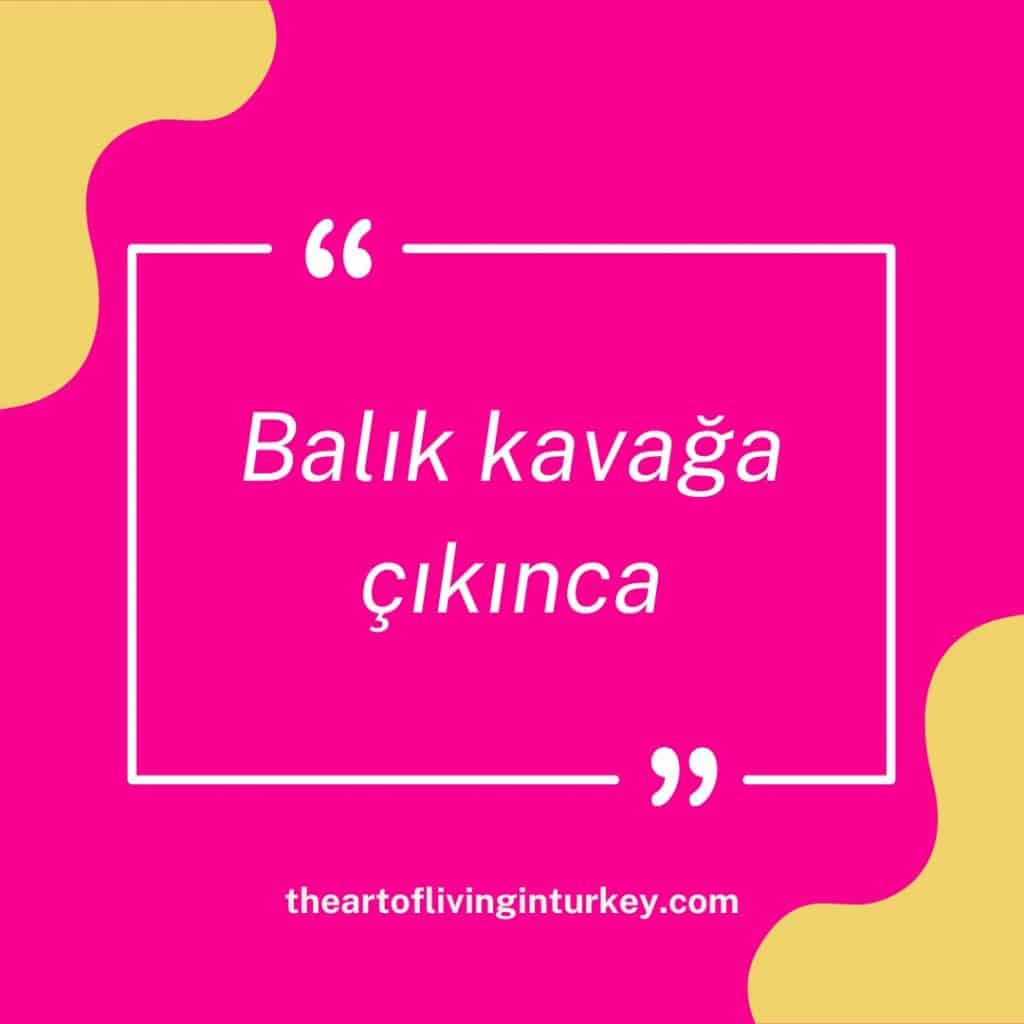
Literally: When fish climb trees.
English equivalent: When pigs fly. When hell freezes over.
Meaning: I just love this Turkish phrase. Of course, in English, we have something similar but I definitely think it is a funny picture thinking of fish climbing trees.
Essentially it is encouraging someone to not have expectations for something to happen when it is nearly impossible for that thing to happen.
See if you can work it into a conversation in Turkish.
For example
O kız, o çocukla ancak balık kavağa çıkınca evlenir. That girl will marry that boy only when the fish is in the tree. (Example from EOdev)
Final thoughts on Turkish proverbs and sayings
I hope you have loved those as much as I do! It’s always fun to use an idiom properly and see a Turk’s response.
It is interesting to me how much proverbs and sayings are used within different cultures. This website has created a pretty epic list of popular Turkish proverbs.
If you scroll toward the end, there is a section of them in Turkish, English counterparts and what they actually mean. Even English idioms can be difficult to understand.
Within British and American English the phrases are completely different and are most time not understood by the other.
Then there are other languages with their own cultures and it adds a whole new mix! I hope these helped you gain a little insight into Turkish culture.
Regardless of where you are on your language-learning journey, I hope these phrases will be of value to you and if nothing else, give you a glimpse into their culture and the things they value.
Perhaps on your next visit, you can dazzle your Turkish friends with your savvy knowledge of their language.
Ready for something more? Check out these Netflix shows that can help you on your learning journey!
Read more:
- Want to learn a bit more about the countries surrounding Turkey
- Read more to figure out about a Turkish SIM card
- Looking for a few day trips from Istanbul: here are 11 of my favorites
- Learn more about Turkey’s history: When did it join NATO?
Turkey Vacation Basics
When I plan a trip these are the websites I use. I hope they help you plan your next adventure as well!
FLIGHTS: I am a huge fan of Skyscanner and WayAway.
VISAS: You can use the free e-visa portal here but for a few extra dollars you can use iVisa and someone else will handle any issues that may come up.
E-SIM: When I traveled to SE Asia I discovered e-sims and I’m never going back. Airalo has been easy and cheap!
TRAVEL INSURANCE: I use TravelInsurance.com for my trips abroad.
CAR RENTAL: I have loved working with Discover Cars when I rent cars in country.
AIRPORT TRANSFERS: I have used these transfers many times and they are always great. If you’d like more options, I also recommend GetTransfers.com as they allow you to compare companies.
ACCOMMODATION: Find the best Turkey hotel deals on Booking.com.
CITY TOURS & DAY TRIPS: You can browse GetYourGuide’s website to find just the tour you’re looking for! We also recommend the MegaPass for major cities.
